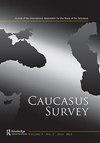在自己家里的外国人:阿布哈兹边境地区事实上的流离失所和消极的安置
IF 0.4
Q3 AREA STUDIES
引用次数: 0
摘要
本文探讨了事实上的流离失所和消极的安置动态在阿布哈兹事实上的国家的边境。事实上的国家的不确定地位为被视为不受欢迎的冲突残余的少数民族创造了一个脆弱的、被剥夺公民权和重新安排的冲突后环境。我有两个论点:首先,事实上的流离失所是一种流离失所的情况,在这种情况下,流离失所者并没有真正离开,但他们周围的景观以及社会政治局势几乎在一夜之间发生了重大变化。第二,这种流离失所伴随着消极的安置,在这种安置中,一个人和/或群体在新创造的事实国家的现实中,在物质和社会意义上被消极地安置在适当的位置。本文章由计算机程序翻译,如有差异,请以英文原文为准。
Foreigners in Their Own Home: De Facto Displacement and Negative Emplacement in the Borderlands of Abkhazia
This article explores de facto displacement and negative emplacement dynamics in the borderlands of the de facto state of Abkhazia. The uncertain status of de facto states creates a vulnerable, disenfranchised and rearranged post-conflict environment for ethnic minorities that are deemed unwanted remnants of the conflict. I make two arguments: First, de facto displacement is a situation of displacement where the displaced do not physically move away but where the landscape around them together with the sociopolitical situation significantly changes almost overnight. Second, that this displacement comes with negative emplacement in which a person and/or group is negatively set in place in a physical and social sense within the newly created reality of the de facto state.
求助全文
通过发布文献求助,成功后即可免费获取论文全文。
去求助
来源期刊

Caucasus Survey
Arts and Humanities-History
CiteScore
1.30
自引率
9.10%
发文量
4
期刊介绍:
Caucasus Survey is a new peer-reviewed, multidisciplinary and independent journal, concerned with the study of the Caucasus – the independent republics of Armenia, Azerbaijan and Georgia, de facto entities in the area and the North Caucasian republics and regions of the Russian Federation. Also covered are issues relating to the Republic of Kalmykia, Crimea, the Cossacks, Nogays, and Caucasian diasporas. Caucasus Survey aims to advance an area studies tradition in the humanities and social sciences about and from the Caucasus, connecting this tradition with core disciplinary concerns in the fields of history, political science, sociology, anthropology, cultural and religious studies, economics, political geography and demography, security, war and peace studies, and social psychology. Research enhancing understanding of the region’s conflicts and relations between the Russian Federation and the Caucasus, internationally and domestically with regard to the North Caucasus, features high in our concerns.
 求助内容:
求助内容: 应助结果提醒方式:
应助结果提醒方式:


